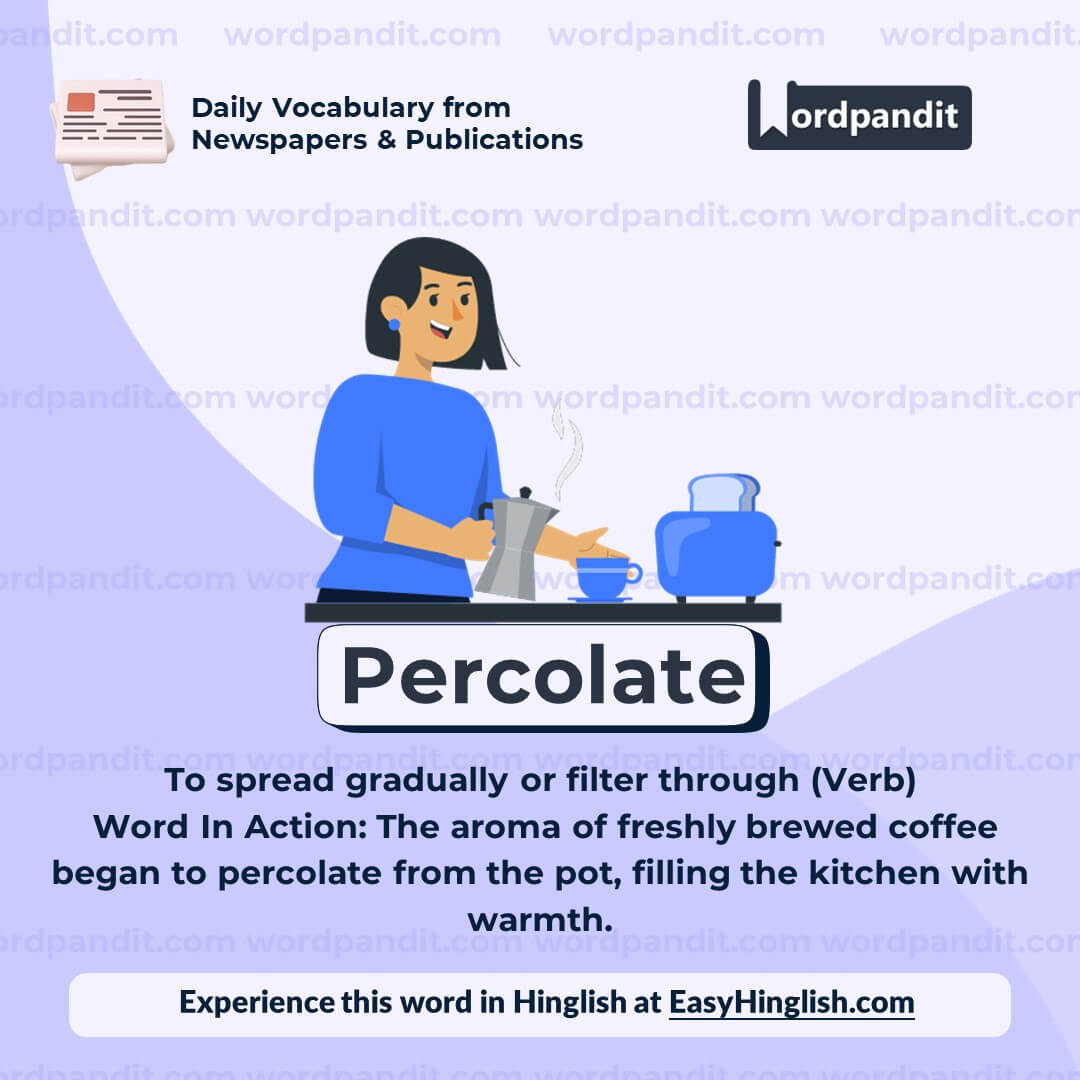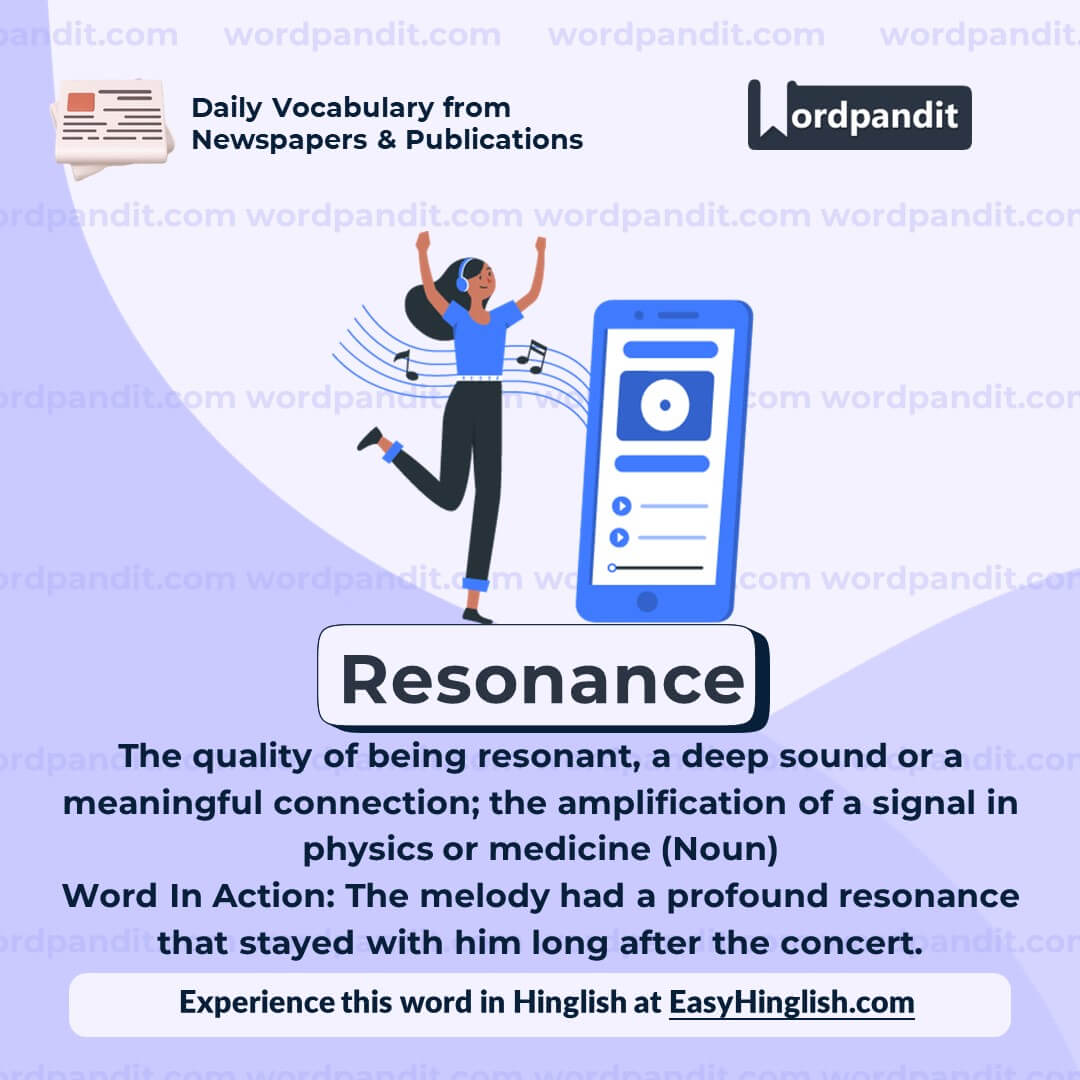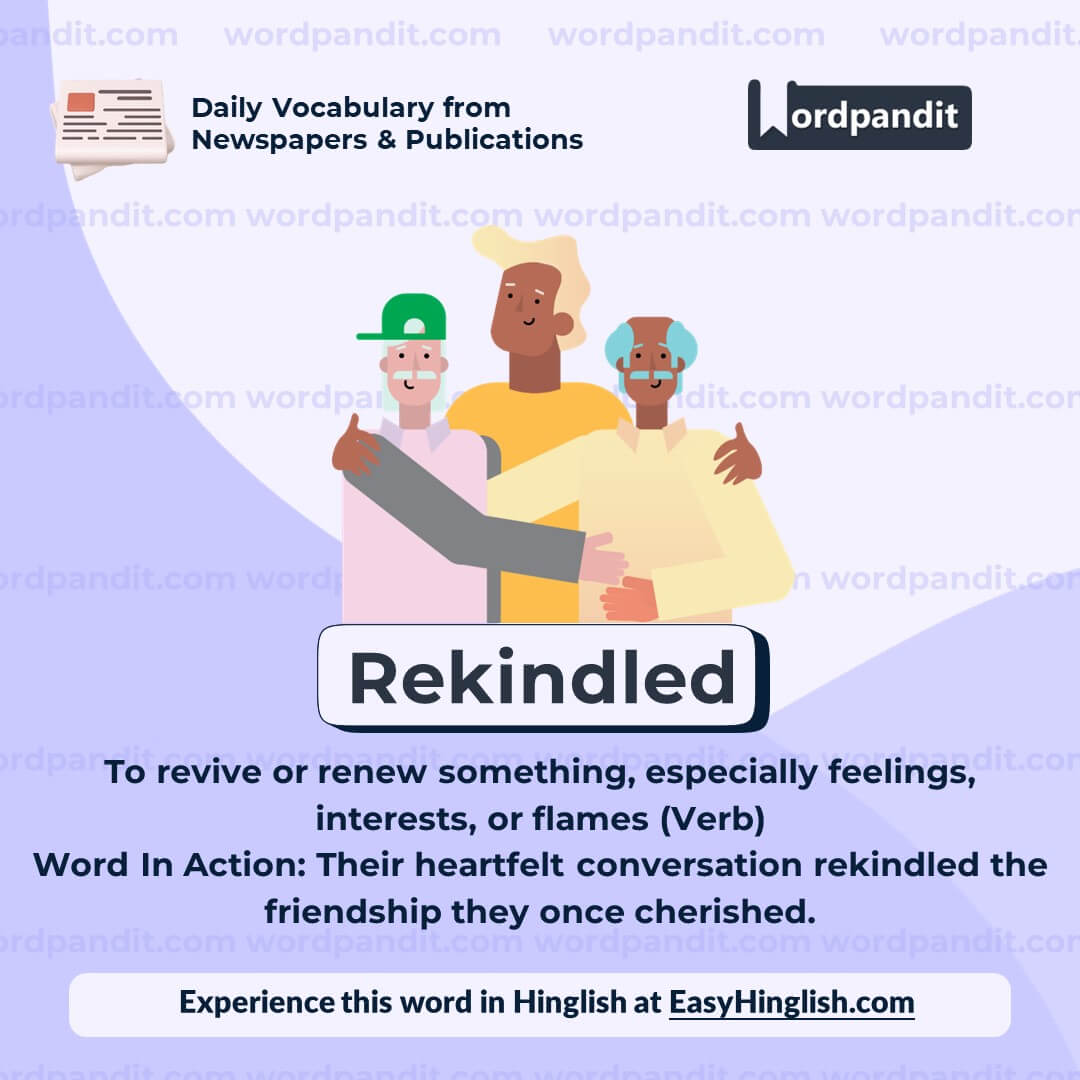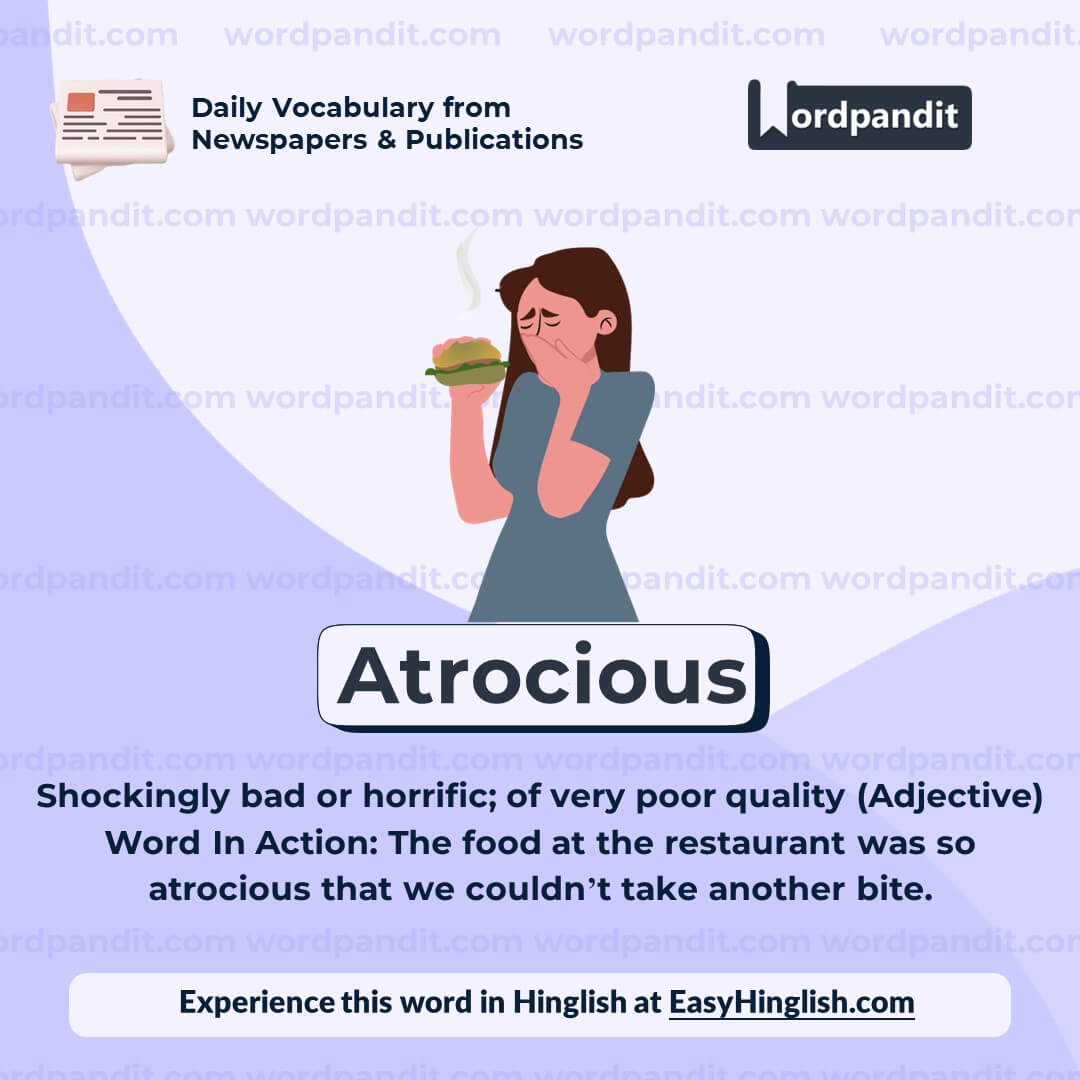Daily Vocabulary from International Newspapers and Publications
Expand Your Vocabulary with Wordpandit’s Global Vocabulary Hub
At Wordpandit, we are committed to helping you develop a truly global vocabulary by drawing from some of the most respected international publications. This section is designed to keep you ahead of the curve by introducing you to words that define global conversations and trends.
The Power of Global Sources
To help you think and communicate on a global scale, we curate vocabulary from renowned international sources, such as:
- The New York Times
- The Washington Post
- BBC
- The Guardian
- The Economist
- Scientific American
- Psychology Today
- And many more...
Stay Global, Stay Competitive
Our daily updates from international publications ensure you are consistently exposed to new words that reflect global news and developments, making sure your vocabulary is not only current but also globally relevant.
Enhance Your Global Perspective
Whether you’re preparing for international exams, aiming to excel in global business communication, or want to enhance your language skills for personal growth, Wordpandit offers the resources you need to thrive in a global context.
Effective Learning, Global Reach
Our learning methodology combines global examples, memory aids, and interactive activities, allowing you to internalize new words effectively and apply them in real-world scenarios.
Begin Your Global Vocabulary Journey Now!
Why Choose Wordpandit?
Practical Learning: Focus on words you'll actually encounter in real-world reading, enhancing your comprehension and communication skills.
Diverse Content: From current affairs to scientific breakthroughs, our varied sources expose you to vocabulary across multiple domains.
Effortless Integration: Make Wordpandit a part of your daily routine. Just a few minutes each day can significantly boost your lexicon over time.
Your Path to Vocabulary Mastery
- Visit our Daily Vocabulary section regularly
- Explore new words and their usage in context
- Practice incorporating these words into your own writing and speech
- Track your progress as your vocabulary expands
Start Your Journey Today
Embark on your vocabulary enhancement journey with Wordpandit. By consistently engaging with our daily posts, you'll build a robust vocabulary that serves you well in academic, professional, and personal contexts.
Remember, a word a day keeps linguistic limitations at bay. Make Wordpandit your daily companion in the quest for vocabulary excellence!
WORD-1: Percolate
Context:
"This Anglo-Japanified aesthetic quickly percolated from the gentry to society at large. At the St Louis World’s Fair in 1904, replicas of Japanese living spaces attracted raves from visitors, one of whom exclaimed that." - Aeon
Explanatory Paragraph:
The word "percolate" refers to the process of gradually spreading through or becoming widespread, much like a liquid filtering through a porous material. It often describes the way ideas, influences, or trends make their way into broader groups or society over time.
Meaning: To spread gradually or filter through (Verb)
Pronunciation: PUR-koh-layt
Difficulty Level: ⭐⭐⭐ Intermediate
Etymology: From the Latin "percolare," meaning "to strain through," combining "per-" (through) and "colare" (to strain).
Synonyms & Antonyms:
Synonyms: Filter, seep, trickle, diffuse, spread
Antonyms: Block, stagnate, halt
Usage Examples:
- Innovative ideas from the tech world often percolate into mainstream industries.
- The smell of freshly brewed coffee percolated through the small café.
- Over time, her enthusiasm began to percolate among the members of the team.
- The principles of democracy gradually percolated through various layers of the government.
Cultural Reference:
"The concept of minimalism, originally rooted in Japanese Zen philosophy, has percolated into modern Western interior design." - Design Trends
Think About It:
How do modern ideas and trends percolate faster in the age of the internet compared to historical times?
Quick Activity:
List three ways a new idea or trend could percolate through a school or workplace environment.
Memory Tip:
Think of coffee being brewed in a percolator, where the liquid spreads through the grounds to create a rich drink, similar to how ideas percolate through society.
Real-World Application:
The term "percolate" is commonly used in marketing and business strategies to describe how a concept or product gains traction and spreads through a target audience.
WORD-2: Resonance
Context:
"We then listened for an echo, a collective response to our call, to glean their magnetic resonance – a technique physicians used to image the soft tissue in our aqueous bodies." - Aeon
Explanatory Paragraph:
The word "resonance" has both literal and metaphorical meanings. Literally, it refers to the quality of sound being deep, full, and reverberating, or the ability of an object to vibrate in response to another. In science, it often describes phenomena such as magnetic resonance imaging (MRI). Metaphorically, it signifies a meaningful connection or response, whether emotional, intellectual, or cultural.
Meaning: The quality of being resonant, a deep sound or a meaningful connection; the amplification of a signal in physics or medicine (Noun)
Pronunciation: REZ-uh-nuhns
Difficulty Level: ⭐⭐⭐ Intermediate
Etymology: From Latin "resonantia," meaning "echo," derived from "resonare" (to resound or echo).
Synonyms & Antonyms:
Synonyms: Echo, reverberation, amplification, harmony, significance
Antonyms: Dissonance, discord, silence, incongruity
Usage Examples:
- The resonance of the singer’s voice filled the entire concert hall.
- Her speech about equality struck a deep resonance with the audience.
- Magnetic resonance imaging (MRI) helps doctors view detailed images of internal organs.
- The idea of sustainable living has resonance among environmentally conscious individuals.
Cultural Reference:
"The works of Beethoven have a timeless resonance, inspiring audiences across centuries with their emotional depth and complexity." - Musicology Studies
Think About It:
How does the metaphorical use of "resonance" help us describe meaningful experiences or connections?
Quick Activity:
Think of a piece of music, art, or literature that has resonated with you personally. Write a short paragraph describing why it left such a lasting impact.
Memory Tip:
Imagine the echoing sound when you shout into a canyon; that reverberation is like resonance, amplifying and connecting sounds or ideas.
Real-World Application:
"Resonance" is widely used in fields like medicine (MRI), physics (acoustic resonance), and culture (emotional or societal impact), making it a key term in both science and art.
WORD-3: Rekindled
Context:
"After the end of the Second World War, the fascination rekindled, and history began to repeat. Japan was poor once again." - Aeon
Explanatory Paragraph:
The word "rekindled" refers to reigniting or reviving something that had diminished or been lost, whether it’s an emotion, interest, or connection. It often carries a sense of renewal or a fresh start, especially for passions, relationships, or inspirations that were once vibrant but faded over time.
Meaning: To revive or renew something, especially feelings, interests, or flames (Verb)
Pronunciation: ree-KIN-duhld
Difficulty Level: ⭐⭐ Beginner
Etymology: From the prefix "re-" (again) and "kindle," meaning "to start a fire or inspire," originating from Old Norse "kynda."
Synonyms & Antonyms:
Synonyms: Revive, renew, reignite, restore, reawaken
Antonyms: Extinguish, suppress, quench, destroy, dampen
Usage Examples:
- The couple rekindled their relationship after years of being apart.
- Visiting her hometown rekindled childhood memories she thought she had forgotten.
- The documentary rekindled public interest in the artist’s forgotten works.
- The team’s victory rekindled their hope of winning the championship.
Cultural Reference:
"The publication of classic novels often rekindles the interest of modern readers, introducing timeless stories to new generations." - Literary Insights
Think About It:
What are some events or experiences that might rekindle a person’s passion for something they once loved?
Quick Activity:
Write about a time when you rekindled an old friendship or hobby. How did it feel, and what sparked the renewal?
Memory Tip:
Think of rekindling as relighting a campfire that had gone out—bringing warmth and life back to something that was fading.
Real-World Application:
"Rekindled" is often used in personal narratives, relationships, and discussions about reviving interests or cultural trends that had lost momentum.
WORD-4: Atrocious
Context:
"Let those who wish to live in their cluttered Sears, Roebuck modern and atrocious bad taste we see so often,’ wrote an aficionado to The New York Times that year. ‘I’ll take the uncluttered.’" - Aeon
Explanatory Paragraph:
The word "atrocious" describes something that is extremely bad, offensive, or appalling. It can be used to emphasize the poor quality of something, such as taste, behavior, or performance. The term often conveys a strong negative reaction, whether to aesthetic, moral, or practical aspects.
Meaning: Shockingly bad or horrific; of very poor quality (Adjective)
Pronunciation: uh-TROH-shuhs
Difficulty Level: ⭐⭐ Beginner
Etymology: From the Latin "atrox," meaning "fierce" or "cruel," later evolving into the Late Latin "atrocius."
Synonyms & Antonyms:
Synonyms: Appalling, dreadful, heinous, ghastly, abominable
Antonyms: Excellent, admirable, delightful, commendable, pleasant
Usage Examples:
- The movie received atrocious reviews for its lack of plot and poor acting.
- Her atrocious handwriting made the note nearly impossible to read.
- The war crimes were condemned as absolutely atrocious by the international community.
- His atrocious singing left the audience covering their ears in disbelief.
Cultural Reference:
"The architecture of the 1970s was often criticized as atrocious by purists, who found its brutalist style overly harsh and unappealing." - Architectural Digest
Think About It:
Why do people sometimes find joy or humor in things that are intentionally atrocious, such as bad movies or kitschy art?
Quick Activity:
Think of an example of something you’ve encountered that was atrocious. Describe why it left such a negative impression on you.
Memory Tip:
Connect "atrocious" to "atrocity" — both words signify something shockingly bad, whether in taste or actions.
Real-World Application:
"Atrocious" is often used in critiques, whether in art, fashion, or behavior, to emphasize the severity of something’s poor quality or offensiveness.
WORD-5: Aficionado
Context:
"Let those who wish to live in their cluttered Sears, Roebuck modern and atrocious bad taste we see so often,’ wrote an aficionado to The New York Times that year. ‘I’ll take the uncluttered.’" - Aeon
Explanatory Paragraph:
An "aficionado" is someone who is very enthusiastic and knowledgeable about a particular subject or activity. The term often conveys a sense of passion and dedication, whether it’s about art, food, music, or any other field of interest. It highlights the person’s deep appreciation and expertise in their chosen area.
Meaning: A person who is highly knowledgeable and passionate about a subject or activity (Noun)
Pronunciation: uh-fish-ee-uh-NAH-doh
Difficulty Level: ⭐⭐⭐ Intermediate
Etymology: From Spanish, derived from "aficionar" meaning "to become fond of," and ultimately from Latin "affectionem," meaning "affection."
Synonyms & Antonyms:
Synonyms: Enthusiast, devotee, connoisseur, fan, admirer
Antonyms: Novice, amateur, dabbler, critic
Usage Examples:
- She’s an aficionado of Italian cuisine and knows every regional specialty by heart.
- The jazz aficionado could instantly recognize the work of any artist by their playing style.
- An aficionado of vintage cars, he spends weekends restoring old models to their former glory.
- The aficionado of modern art visited galleries worldwide to expand his collection.
Cultural Reference:
"The term 'aficionado' is often used in bullfighting culture to describe passionate fans who understand the nuances of the sport." - Spanish Traditions
Think About It:
What is the difference between being a casual fan and an aficionado of a subject or activity?
Quick Activity:
Think of a topic or activity you are passionate about. Write a short paragraph explaining what makes you an aficionado in that area.
Memory Tip:
Think of "aficionado" as someone who has an affectionate passion and knowledge about their hobby, like a loyal fan.
Real-World Application:
The term "aficionado" is commonly used in culture, fashion, art, and gastronomy to describe individuals who have deep expertise and passion for a particular field.
















